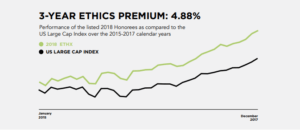There is a general perception that a business underpinned by ethical principles will be a good business. Good equating to financially viable and profitable. Despite this for many of those tasked with leading an organisation the short-term demands of reaching targets, financial and others, mean that ethical principles are often compromised.
At Elgood we want to make it easier for decision-makers to stick to their principles. We believe we can help foster good business by:
- Providing evidence that ethics pays
- Emphasising the need for a long-term approach
- Proving a vehicle for dialogue and practice.
So, firstly here are some pointers to places we feel provide good arguments for why a business built around ethical principles will be a good business.
This article Ethics Pays pulls together a number of really useful resources and highlights three key areas:
- A good reputation is valuable
Research quoted shows that a good reputation pays off in lower costs, higher sales and the ability to charge higher prices than firms with a poor reputation. If this argument is one you could use to convince your colleagues The Reputation Institute has further research you could use to build your case.
- Illegal conduct can be extremely costly
There are far too many examples both in this article and in the general media showing the costs of illegal or unethical conduct.
- Good Governance pays off financial
The benefits of having good governance structures include higher profitability, sales growth, market values and higher stock prices.
Another piece of research done by Ethisphere supports the claim that it is possible to do well by doing good, in the longer term.
 Both this graph and the article refer to the longer term and the graph explicitly compares a two-year period. Many organisations are focused on this month, this quarter or this half year so in this context, a two-year time frame is the longer-term. If we are to encourage better decision-making then we need to shift from the immediate time frame to a longer time frame.
Both this graph and the article refer to the longer term and the graph explicitly compares a two-year period. Many organisations are focused on this month, this quarter or this half year so in this context, a two-year time frame is the longer-term. If we are to encourage better decision-making then we need to shift from the immediate time frame to a longer time frame.
Earlier research by the Institute of Business Ethics (“IBE”) and reported in ‘Does Business ethics pay? Revisited’ describes research into the relationship between the provision of business ethics training and corporate financial performance over a five-year period. One of the core questions in the research was, “Do you offer training to members of staff on the meaning and use of your (ethics) code?” The research then looked at the performance of companies who had:
- Corporate revealed ethics (a published code included in documents such as the corporate statement mission/vision statements)
- Corporate applied ethics (a code which was supported by actions such as training initiatives)
The report concluded that “using four measures of financial performance, companies with corporate applied ethics perform better financially than those with only corporate revealed ethics. This difference was found not to be due to the difference in company size nor risk effects.”
So, a standalone ethics policy is not the answer: it is the application of a core set of organisational values to decision-making within the business that results in better organisational performance. To have a good business you need the ethical principles backed up by effective training and constant re-inforcement.
We have developed a business game that can be incorporated into training initiatives and used to create a dialogue around significant business decisions. It uses a framework to link the business decisions, the organisation’s values and a variety of stakeholder groups. The decisions taken have a direct financial impact on the performance of the business and on hidden drivers of performance, corporate reputation and leadership trust.
Read more about ethics in business, the importance of values or download one of our white papers:
